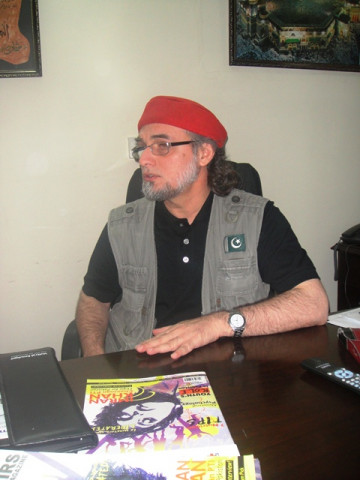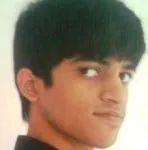After a hiatus of few months, Zaid Hamid is back in the news and regrettably - though not surprisingly - for all the wrong reasons. Apparently, his labeling of SAFMA as an extension of RAW, didn’t sit too well with the SAFMA people and they have decided to press libel charges against them.
A week before this new development, a few friends and I met him at his house:
The assistant introduced us and left. The desk, the comfy seat, the black monitor and sheets of papers scattered all over the table were a shock. I was expecting a middle-class drawing room embellished with cheap vases and dirty artificial flowers. The eagerness with which the occupant of the house met us belied the impression that the untidy office gave. He wasn’t that busy after all.
This middle-aged man with his square glasses, short-beard and trademark red cap, knew more of the youth psyche than could be guarded by a cautious young interviewer. Articulating our names with a vigor that one associates with army generals, he embraced each of us as if we had just volunteered for a battle no one was ready to fight. His dripping self-assurance made us realize that none of us would leave unimpressed. And surely none of us did.
Zaid Hamid is a fascinating being. Equally comfortable and convincing in both English and Urdu, he gave disillusioned people what they want the most and need the least: stirring words. A well-endowed tongue is not a waste; it’s a guarantee of survival in bad times and fame in good ones. However, listening to Zaid Hamid hardly reminded me of Jacque Vergus, Abu Zayd of Saruj, or any other devil’s advocate. He didn’t dissemble; what he said was what he meant. His assistant had already encouraged us to put any kind of questions to the man he considered ‘a holy warrior, an intellectual, and a saint’.
In spite of all his attempts to act humble, Zaid Hamid’s words were pregnant with the vanity which every famous man, especially the one who has raised himself from complete oblivion to the pedestal of popularity, subconsciously considers his hard-earned right.
The image that he had built of himself was not a simple one: he was a humble, ordinary citizen in relation to his country and an ideologue and a mentor in relation to his countrymen. It might be difficult to reconcile his ‘ordinariness’ with the ‘extraordinariness’ that elevated him to the position of a mentor, if one fails to see the awkward position it puts a well-known person in to only self-efface himself or to only glorify himself.
Conviction offers nothing to a good orator. Speaking is just a science: you know when to talk loud and when to whisper; when to punch the dais and when to move away from it; when to recite a ditty and when to use foul language. From the first word to the last, sincerity can’t play any part in a speech. Yet, the conviction with which Zaid Hamid spoke reminded me of Malcolm X and Trotsky. He had more in common with them than his eloquence. He had not only revised his ideas once but had also unwittingly planned out his own fall.
Zaid Hamid is abhorrent to the idea of both western democracy and totalitarianism. The system he proposes is a child of both and something which is, according to him, similar to the early Islamic caliphate. It requires no overhaul of the present system, he asserts; one just has to follow the constitution. The clause of constitution which interests him the most is the one concerned with the character of the parliamentarians. He wants a supreme panel to decide if a candidate passes the leadership criteria set in the constitution or not. It would effectively filter out the ‘undesired candidates’.
But wouldn’t this system give way to dictatorship?
It certainly would. As it turns out, the ‘undesired candidates’ include not only the corrupt and opportunists but also the separatists and candidates with secular leanings. The greatest benefit of this system, he explains, would be to get rid of MQM, ANP and PPP, all avowed enemies of Pakistan and on payroll of Hindu, Jewish and Christian Zionists.
The idea of uniform state that he promulgates bears uncanny resemblance to the Soviet Politburo of early 1920s: the state is to become an idea. Though he repeatedly states otherwise, only the secular parties draw flak from him; apparently the conservative parties aren’t as grave a danger as the secular ones.
So is his Takmeel-e-Pakistan just a right-wing movement?
Not according to him.
Zaid Hamid had used ‘Hindu baniya’ and ‘Indian’ interchangeably in many of his speeches. To many, it laid bare his deep mistrust of the minorities and his fascist tendencies.
On being confronted with the question about his careless choice of words, he took pains to explain that the Pakistani Hindu was never his target. In fact, many Pakistani Hindus had joined his movement because ‘they felt more secure with them’. The ‘Hindu baniya’, to him, was the name that the Hindu Zionists, ‘who have been ruling over India since its independence’, have begun to signify. Asked if one could have a positive attitude towards India and still have a positive attitude towards Pakistan, he answered in the negative. America was in hands of Christian Zionists, India in hands of Hindu Zionists and Israel in hands of Jewish Zionists, who were bent on destroying Pakistan. In such a situation, there couldn’t be a constructive dialogue with any of these countries.
He rubbished all peace proposals and roundly condemned Aman ki Aasha. Until his one demand was met he was indifferent to any kind of bilateral relations: the triumvirate would have to ‘back off’.
Since Mr Zaid adamantly denied that he was discriminating against the Pakistani Hindus, his viewpoint on their citizenship status was noteworthy. Sharia Law demands that the state exact Jizya tax from its non-Muslim citizens as a fee for the security that the state provides them. Zaid Hamid took some time to shed light on the positive aspects of Sharia law (e.g. the command to keep streets clean, to establish peace etc.) and to expose the West’s ignorance of it.
Soon his passion took hold of him and he started repeating things he had already explained. This was the only moment when magic of his words began to weaken and I became more aware of the petite newscaster on the monitor screen behind him than of him.
Thankfully, this did not last long. As regards the Jizya tax, he was wholly in favor of it. According to him, treating Hindus as Dhimmies wasn’t akin to giving them a second-class citizenship since they didn’t have to pay Zakat and were exempted from military service in return.
If the state of Pakistan were to tax its nationals on the basis of religion, wouldn’t it alienate the minorities?
Again, his answer was in negative. Jizya, he explained, ‘is peanuts’ and thus couldn’t force any man to ‘revert’ to Islam.
Listening to this man speak in person is no worthless experience. Of the four of us who went in, three returned converted. Some of his theories seemed just too far-fetched to me (maybe because I never had stomach for them). For instance, he considers that the genocide of Bengalis was ‘the biggest lie of the 20th century’. ‘We have no credible information about the killing’, he claimed, ‘since everything came from Indian or American sources’.
On being reminded of Sadeeq Salik’s ‘Meine Dhaka Doobtay Dekha’, Mr Zaid conceded that in the war some isolated incidents might have occurred. Still, Zaid Hamid is one of the very few people who can never be pessimistic and who are so fanatically devoted to one idea. He is not as intolerant of criticism as the press made him appear after the assassination of a respected Sunni leader.
On being informed of Amir Liaqaut’s recent allegation that he considers himself a prophet, he only guffawed and changed topic. When asked for a message for the youth, Zaid Hamid had two words for them: ‘Educate Yourself’.
'Zaid Hamid told me so'
Zaid Hamid is back in the news and regrettably for all the wrong reasons - so I decided to meet him...



COMMENTS
Comments are moderated and generally will be posted if they are on-topic and not abusive.
For more information, please see our Comments FAQ